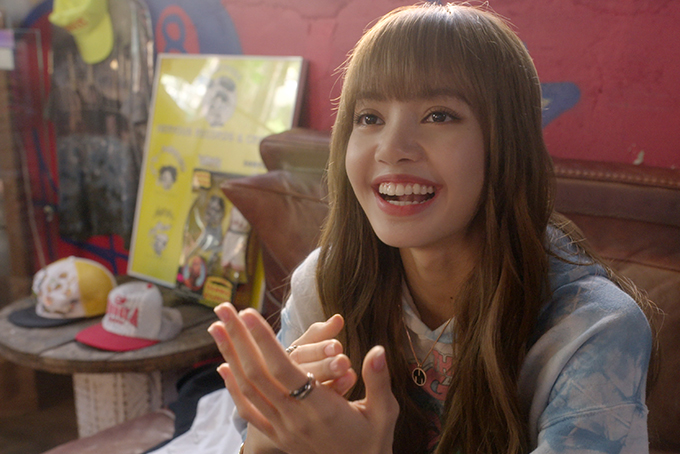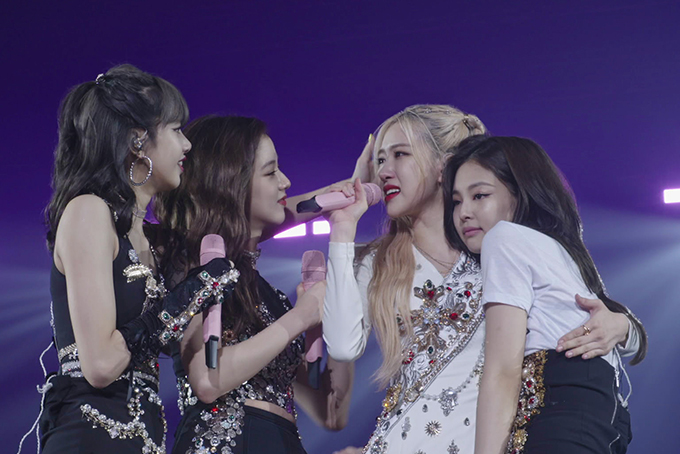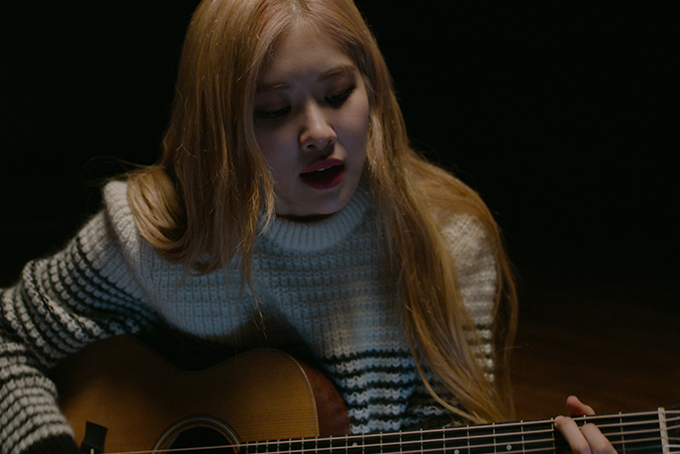Following in the lineage of Madonna, Lady Gaga and Taylor Swift, South Korean girl band Blackpink are the latest superstars to enter the world of documentaries with their new Netflix film, Blackpink: Light Up The Sky.
Their highly dedicated fandom—known as ‘BLINK’—can tell you almost everything you need to know about Jisoo, Jennie, Rosé, and Lisa. Within the multitudes of fan content, from Tumblr sites to YouTube channels, there already exists a well-documented timeline of their stratospheric rise to success since debuting with their single album Square One in 2016. Yet, there is much we don’t know about the group, something director Caroline Suh has endeavoured to uncover through an intimate portrait into the lives of these four young women.
Over 79 minutes, Suh creates a compelling watch for both newcomers to the band as well as those who have closely followed both Blackpink and the K-pop industry. Each member is given room to reflect on their success and their lives, allowing a glimpse into how they’ve become the world’s biggest girl band (work, work and more work) and insight into why Blackpink are idolised by millions of people around the world, including Selena Gomez, Lady Gaga, Louis Vuitton’s Nicolas Ghesquière and Dior’s Maria Grazia Chiuri. The film is surprisingly candid in places, particularly as they reveal just how tough their years of training were mentally, physically and emotionally.
Featuring archive footage and unfiltered moments between the band, this is everything we learned (and loved) about Light Up The Sky.

Being powerful is a multifaceted state
Blackpink have redefined the idea of what a powerful girl band looks and sounds like, particularly offstage—they’re determined and competitive, but they’re also sensitive and supportive. Their relationship has been built on generosity, whether it’s through helping each other overcome language barriers or sharing skills.
As with all K-pop proteges, they trained for 14 hours a day, were graded monthly and criticised heavily— the difficult conditions triggered Blackpink’s fighting spirit. For Rosé, the thought of leaving without accomplishing anything was an “embarrassment”, while Jennie’s steely side emerged like armour: “The tougher they treated me, I was like, I’m going to get through it and I’m going to show them that I’m worth it.”
To train as an idol in K-pop, you’re up against dozens of equally hungry trainees, and having innate talent doesn’t automatically mean you’re going to make it. The temptation to step on others to get to the top is always there, but for Blackpink, there was no jostling for centre position. “Everyone has their place and their role,” says Jisoo, and when that’s accepted and understood, “that’s when synergy is born.”

Stay creative, be adventurous
Rosé is shown in a darkly lit rehearsal room playing guitar and singing; her way of releasing stress. “Sometimes I miss my trainee days because we were surrounded by music all the time, but these days we’ve got a lot of work so I have to make time for this,” she says. For Rosé, an important (and nerve-racking) creative step has been getting into the studio with her own songs, which she likens to a baby learning to talk. She can also struggle with voicing her opinions, which she worries might be wrong. Like so many young musicians, she’s on a learning curve, but as with everything in her life, she’s embracing it firmly even when it scares her.
Being in the biggest girl band in 2020 isn’t just about making music. It’s everything around it, including fan events, meticulous tour rehearsals and being brand ambassadors for four renowned fashion houses: Celine, Saint Laurent, Dior and Chanel—just one sign of how much cultural cache and power they possess. As they start working out a new set of stage outfits, Jennie calls Blackpink’s now-iconic fashion “one of our most creative parts.” As Rosé points out, “Fashion is international. When there’s no boundaries, that’s when you can get creative.”

Women supporting women is not only necessary, but vital
Ask any BLINK what they love about the band and one of their first responses will be the girls’ friendship. From the early days, Blackpink members have been there to support one another and their bond is now closer to sisters than bandmates.
They constantly give each other props (even when roasting each other over their audition tapes) whether it’s for their outfits, their idiosyncrasies or the tough moments they’ve managed to endure. The latter can mount up; once Blackpink hit number one on global charts with their debut single Whistle, the pressure was on. The less-is-more strategy that’s marked their musical output over the years has created vast columns of opinion from fans and music critics alike. With each rung they’ve climbed, so has anticipation for their next history-making achievement. They constantly occupy a world of bigger, better, faster, stronger.
Jisoo’s take on the constant public scrutiny is that it’s akin to “being chased”, while Jennie describes such moments as “overwhelming”. And yet throughout, Jisoo, as the oldest, looks over the members, caring for them, while Lisa’s infectious positivity keeps them energised. When she worries that she might bring a little too much energy to the group, she is drowned out by loving protests that she should never stop.

Coachella was a major turning point
In April 2019, Blackpink became the first female K-pop group to perform at the legendary US festival. The footage from their set is almighty: costumes and long hair floating on the desert winds, their presence as solid as the landscape around them, with thousands jumping around to their hit songs. You’d never guess that Jisoo was ill and had a bad back, or that their jangling nerves and initial self-doubt had caused Rosé to ask, bewildered, “Why are there so many people?” upon seeing the waiting Coachella crowd.
It’s at this point in the film that you sense the pressure that the girls talk about elsewhere. They’re dressed to the nines, hair and makeup perfect. They look like warriors. But they are surrounded on one side by bustling staff ushering them to the stage, on the other the waiting crowd, their fans infiltrated by potential naysayers and an expectant media. It’s a make or break situation, not just for them but their team, their label, and even South Korean pop music as an often maligned industry in the west. As they do a pre-show huddle, forming a protective circle that shuts out everything around them, their sisterhood and solidarity glows. It’s a brief moment, but one of the film’s most powerful and insightful.

Fame, fortune and the future
In the immediate future, there are plans to show a more intimate side to the four via their music. “We feel like we want to tell more of a personal story,” says Teddy Park, who has produced all of the band’s music since their inception, including the recently released The Album.
When asked to consider the next 20 years, they hope to have travelled the world on their own terms, and not via the exhausting schedules of a touring itinerary. They would like stints of living in Paris, the US or the UK. There might be marriages and babies.
“It doesn’t matter if we get old and get replaced by the younger generation, as long as there is still someone talking about us,” decides Lisa. “Because they will still remember how we shone so bright.” Fame might not last, but Blackpink is forever.
Blackpink’s documentary Blackpink: Light Up The Sky is streaming on Netflix now.





